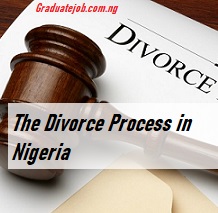The Divorce Process in Nigeria could be challenging if you don’t have knowledge of how to go about it. First, let’s know that Divorce is simply the ending of a marriage union. You will want to know what causes divorce among married people.
The divorce laws and processes are contemporary issues for people considering divorce in Nigeria. There are so many things to consider including, child custody and support, alimony, and property sharing among others, it is beneficial you learn and understand the divorce process in Nigeria before filing for divorce.
In Nigeria, the matrimonial Cause Act (MCA) LFN 1990 and Matrimonial Causes rules are the major laws guiding divorce laws and processes. The partner seeking to dissolve a marriage is the petitioner, the other party sued is the Respondent
With more details, let us look at the divorce processes in Nigeria
Grounds For Divorce
It is important to know the grounds for divorce under Nigerian law. An irretrievable marriage is the principal ground of divorce in Nigeria.
For a marriage to be irretrievable, it must satisfy these conditions of section 15(2) of the matrimonial causes act, These can be classified into two
- Fault divorce
- No-Fault divorce
It states:
Fault Divorce
- That the Respondent has willfully and persistently refused to consummate the marriage. This is where one party has continuously refused to have sex with the other person
- Since the marriage, the respondent has committed adultery and the petitioner finds it intolerable to live with it the respondent. Evidence of adultery is helpful but the person with whom the adultery was committed must be identifiable.
- Since the marriage, the respondent has behaved in a way that the petitioner cannot reasonably be expected to live with the Respondent. The petitioner should be able to convince the court of the intolerable behaviours’ of the respondent. This behaviour could be acts of violence, drunkenness, lack of financial support, or recklessness. Intolerability is a ground for divorce.
- That the respondent has deserted the petitioner for a continuous period of at least one year, immediately proceeding with the presentation of the petition. The petitioner should be able to convince the court that the respondent has abandoned him/her for at least a year. You should note that living apart doesn’t amount to abandonment
- That the other party to the marriage has, for one year, failed to comply with a decree of restitution of conjugal rights under the decree. When the respondent has refused to cohabit even when the conjugal rights have been restituted by the court
- That the other party to a marriage has been absent from the petitioner for such time and in such circumstances as to provide reasonable grounds for presuming that the person is dead. In this case, it is assumed that any partner who has been absent for seven years or more is presumed dead.
No-fault divorce
- That the parties to the marriage have lived apart for a continuous period of at least two years immediately proceeding to the presentation on the petition and the respondent doesn’t object to the divorce being granted. Both parties must have lived apart for two years and there is no objection to a divorce
- That the parties to the marriage have lived apart for a continuous period of at least three years immediately preceding the presentation of the partition
When you have proven one or more of the conditions, the court decrees an order known as decree nisi. Which is a temporary order to separate the couple, both parties are not allowed to remarry at this point and still have the right to appeal. After three months, the order becomes automatically absolute, at this point, both parties cannot appeal.
The divorce process in Nigeria
Now you know the grounds on which you can divorce your spouse under the Nigeria law, here is a view of the divorce processes
- Your lawyer will file a petition for divorce in the high court. The petition file contains your marriage details, reasons for a divorce, what you want to gain from the divorce, and evidence if available
- After the petition is filed and given a case number in court, the papers are served to your spouse and his lawyer. He is given a maximum number of 30 days to respond to the petition, this includes if he wants the divorce or not
- The case will be brought to open court where a judge will listen to both parties. Available witnesses will appear in court too.
- If a judge is satisfied with the grounds of divorce, he declares what is known as “decree nisi” which means that the couple can be separated. However, you will have to wait for another three months before this becomes absolute
- The judge grants custody of the children to either of the spouse he/she feels is in a better position to cater to them, has the right to make orders for payment of child support and management of family properties
The Two Years Rule
To protect the institution of marriage, the law states that a spouse or both parties can request to divorce after two years of marriage unless a leave of court is sought. However, there are exceptions to the rule which are cases of rape, sodomy, adultery, and refusal to consummate the marriage.
Duration of a divorce process
A marriage done under customary laws may take as little as three months to round up its processes but under the statutory law, a divorce will last a year or more if it is properly managed. If not, it can take two or more years.
Cost of getting a divorce
The standard cost and service of good divorce lawyers range from two-fifty thousand and above, The cost of getting a divorce differs for each divorce lawyer you consult, the lawyers charge based on their level of experience, competence, and nature of divorce.
The divorce process in Nigeria is complex and time-consuming. This is because marital cases are seen as sacred and sensitive issues under Nigerian law. you must have proved to the court that the marriage is irretrievable according to its law. it is advised to consult a lawyer experienced in handling divorce affairs to make the process easy.
ATTENTION!!! Click here to JOIN OUR TELEGRAM CHANNEL, Where you can first-hand Job Alert on High paying and available Job Vacancies IMMEDIATELY






